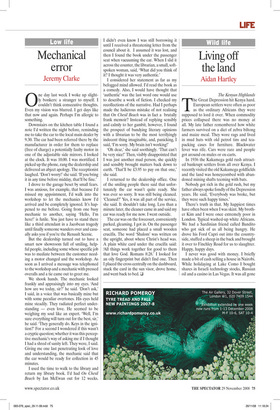Mechanical error
Jeremy Clarke
One day last week I woke up slightly bonkers: a stranger to myself. I couldn’t think consecutive thoughts. Even my vision was blurred. I get days like that now and again. Perhaps I’m allergic to something.
Downstairs on the kitchen table I found a note I’d written the night before, reminding me to take the car to the local main dealer by 9.30. The car had been referred there by the manufacturer in order for them to replace (free of charge) a potentially faulty motor in one of the adjustable side mirrors. I looked at the clock. It was 10.00. I was mortified. I picked up the phone, rang the dealership and delivered an abject apology. The receptionist laughed. ‘Don’t worry!’ she said. ‘If you bring it in any time before midday, that’ll be fine.’ I drove to the garage beset by small fears. I was anxious, for example, that because I’d missed my appointment, I’d walk into the workshop to let the mechanics know I’d arrived and be completely ignored. It’s happened to me before. Going from one busy mechanic to another, saying ‘Hello, I’m here!’ is futile. You just have to stand there like a third attendant in a Jacobean tragedy until finally someone wanders over and casually asks you if you’re the Renault Scenic.
But the dealership turned out to have a smart new showroom full of smiling, helpful people, including some whose specific job was to mediate between the customer needing a motor changed and the workshop. As soon as I arrived a message was telephoned to the workshop and a mechanic with pressed overalls and a tie came out to greet me.
We shook hands. The mechanic looked frankly and appraisingly into my eyes. ‘And how are we today, sir?’ he said. ‘Don’t ask,’ I said, in a voice that was basically mine but with some peculiar overtones. His eyes held mine steadily. They radiated perfect understanding — even love. He seemed to be weighing my soul like an expert. ‘Well, I’m sure everything will turn out for the best, sir,’ he said. ‘They generally do. Keys in the ignition?’ For a second I wondered if this wasn’t a cryptic question; whether it was this perceptive mechanic’s way of asking me if I thought I had a shred of sanity left. They were, I said. Giving me one last penetrating look of love and understanding, the mechanic said that the car would be ready for collection in 45 minutes.
I used the time to walk to the library and return my library book. I’d had On Chesil Beach by Ian McEwan out for 12 weeks. I didn’t even know I was still borrowing it until I received a threatening letter from the council about it. I assumed it was lost, and then I found the book under the passenger seat when vacuuming the car. When I slid it across the counter, the librarian, a small, softspoken woman, said, ‘What did you think of it? I thought it was very authentic.’ I considered her statement as far as my befogged mind allowed. I’d read the book as a comedy. Also, I would have thought that ‘authentic’ was the last word one would use to describe a work of fiction. I checked my recollections of the narrative. Had I perhaps made the ludicrous mistake of not realising that On Chesil Beach was in fact a brutally frank memoir? Instead of replying sensibly and calmly to her gambit, however, I found the prospect of bandying literary opinions with a librarian to be the most terrifyingly indecent thing imaginable, and, panicking, I said, ‘I’m sorry. My brain isn’t working!’ ‘Oh dear,’ she said soothingly. ‘That can’t be very nice!’ Then, visibly disappointed that I was just another mad person, she quickly and sensibly brought matters back down to earth. ‘That’ll be £3.95 to pay on that one,’ she said.
I returned to the dealership office. One of the smiling people there said that unfortunately the car wasn’t quite ready. She was ever so sorry. It was still being cleaned. ‘Cleaned?’ Yes, it was all part of the service, she said. It shouldn’t take long. Less than a minute later, the cleaner came in and said my car was ready for me now. I went outside.
The car was on the forecourt, conveniently parked, gleaming. I got in. On the passenger seat, someone had placed a small wooden crucifix. The word ‘Shalom’ was written on the upright, about where Christ’s head was. A plain white card under the crucifix said: ‘All things work together for good to them that love God. Romans 8:28.’ I looked for an oily fingerprint but didn’t find one. Then I placed the cross centrally on the dashboard, stuck the card in the sun visor, drove home, and went back to bed. ❑


































































































 Previous page
Previous page